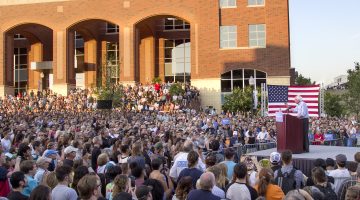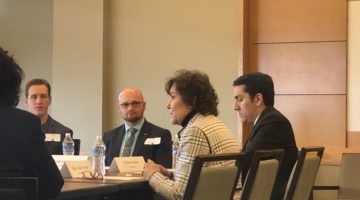There are growing concerns that in our current national political environment, American democracy is under assault. This can be seen in any scan of newspaper headlines discussing politics. Moreover, the results of a major bipartisan poll published in June 2018 show that over half of Americans believe the United States is in “real danger of becoming a non democratic, authoritarian country”. The poll was commissioned by the George W. Bush Institute and the University of Pennsylvania’s Biden Center. The positive news from the poll is that Americans continue to overwhelmingly support the idea of democracy, and think it is critically important that the system inherited from the nation’s Founders be saved.
At the close of the Constitutional Convention in Philadelphia in 1787, it was reported that a woman asked Benjamin Franklin, “…what have we got – a Republic or a Monarchy?” Franklin replied, “A Republic, if you can keep it”. Since the beginning of the American “constitutional” experiment, the United States has been a “republic” with a representative democracy. The fundamental idea was – and continues to be – that the “sovereign” power in America would be held and exercised by the people, as opposed to being held and exercised by a monarch, an autocrat, or an authoritarian. Thomas Jefferson – among other founders – was concerned about the government being controlled by a person who considered himself a “demi-god”.
Implicit in the American concept of democracy was free and fair elections, an educated electorate, active citizen participation, the protection of individual rights and liberties, a mandate that America would have a strong and independent judiciary and rigorously follow the rule of law, an application of the law equally to all citizens, and freedom of speech and the press (as well as the truthfulness of information) would not be impaired. In order to impose limits on the powers of the federal government, and to provide for the protection of various civil liberties and personal rights and freedoms – and to attain the ratification of the U.S. Constitution, the Bill of Rights were drafted and added to the Constitution. Additionally, the government was organized into three separate branches of government in order to create necessary “checks and balances”.
In the 230 years since the ratification of the Constitution, the United States model of democracy has pretty much worked as it was intended. And while one or more leaders have attacked some of the foundations of the democracy, democratic norms have been the practice, and the risk of true authoritarian rule have very rarely been raised.
In order to achieve the sad transition to authoritarianism in other nations, the following things often occurred, starting with the undermining, attacking, and/or disabling of democratic institutions and pillars. In some ways, it almost seems as if there is a tyrant’s playbook that is used. There were efforts to censure or challenge the free press, or claims were made by those in control that what was reported was inaccurate and false. In some cases, press freedoms were limited or suspended, and the authoritarian leaders began to control the media, messaging, and information, and government propaganda became the rule. Dissenters were intimidated, demonized, or attacked as dangerous. Access to voting was limited, or eliminated. The rule of law was constantly under siege, and eventually smashed. In this regard, the independent judiciary was criticized and condemned, as was the legislative branch. In some countries, their constitutions were suspended and emergency powers granted to the leaders (which allowed the “leaders” to gather all of the mechanisms of power), minorities were marginalized or made into scapegoats and excluded from government participation (or worse), citizen rights and freedoms were curtailed and/or discarded, protests were prohibited, critics attacked and silenced, and political opponents taken into custody.
Benjamin Franklin’s challenge that we need to work to “keep” and save the American democratic republic our Founding Fathers created for us is as relevant today as it was when first made. And the poll mentioned above suggests that Americans are worried. There are at present real threats to our democracy. Putting aside the cyberattacks from one or more foreign powers, there is a homegrown threat – starting in the Executive branch – that is subjecting the American democracy to a test.
Keeping and maintaining a resilient and healthy democracy requires citizen knowledge, active engagement, participation, protest (when necessary), the focus on “real” facts, challenges to mis-truths and disinformation advanced by the government, collaboration of – and cooperation and discussions between – various interest groups, compromise for the good of the nation, and the vigorous support of the fundamental institutions and processes of democracy. Those include, of course, the rule of law, checks and balances – with an energetic and independent judiciary and legislative branch, the freedoms of assembly, religion, and speech, and those other vital civil and personal rights set forth in the Bill of Rights. Americans must also fight any efforts to unfairly discredit the Department of Justice, the Federal Bureau of Investigation, and true bipartisan, independent investigations.
In addition, Americans must be alert to and attempt to counter authoritarian tendencies in their elected representatives, cheer for a “free” and unrestricted press and the unrestrained dissemination of information, demand that its elected representatives be held accountable for bad behavior and actions that fail to put America above party or “leader”, oppose the consolidation of power (and especially military power) in any person or party, and forcefully and loudly fight – and pushback against – any efforts to restrict or interfere with elections or election processes.
Only by doing such things, and really staying “woke” to the diminishment of individual liberties and freedoms – and being constantly attentive and engaged – can Americans counter threats to and keep our American democratic republic.
Seth Bell studies political science and can be reached at jaceygonzalez@sagebrush.unr.edu and on Twitter @NevadaSagebrush. Bell’s opinions are his own and do not reflect those of The Nevada Sagebrush.












